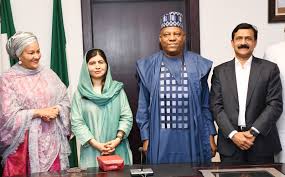The Malala Fund has announced a significant investment of $7.8 million aimed at enhancing girl-child education programs across Nigeria. This initiative, revealed by CEO Lena Alfi in Abuja, underscores the organization’s commitment to addressing educational disparities faced by girls, particularly in northern regions where socio-economic and cultural barriers hinder their access to schooling.

Since its establishment by Nobel laureate Malala Yousafzai in 2013, the Malala Fund has championed girls’ education through various partnerships and grassroots initiatives. This latest funding will support local organizations working to improve educational access and quality for girls, especially in marginalized communities. Alfi emphasized that the investment reflects ongoing efforts to create an environment where every girl can pursue education without obstacles.
To strengthen its operations in Nigeria, the Fund has appointed Nabila Aguele as Chief Executive, Nigeria, and Gayatri Patel as Chief of External Affairs. Aguele, with two decades of experience, is expected to leverage her understanding of the Nigerian educational landscape to tackle systemic barriers preventing girls from accessing education. She highlighted the importance of policy advocacy and collaboration with local organizations to create impactful educational policies.
The timing of this investment is crucial, as Nigeria grapples with significant educational challenges. In northern regions, cultural norms and economic hardships often lead to high dropout rates among girls. Aguele stated that the Malala Fund aims to address these issues comprehensively, fostering a supportive environment for girls to pursue education.
The Malala Fund’s mission is to ensure that all girls receive 12 years of free, safe, and quality education. The organization has invested over $17 million in programmatic grants across seven countries, including Nigeria, and has played a pivotal role in advocating for girls’ education on global platforms.
While the Malala Fund’s efforts are commendable, the challenges facing girl-child education in Nigeria are multi-faceted. Issues such as inadequate school infrastructure, a shortage of qualified teachers, and societal attitudes towards female education persist. According to Aguele, addressing these challenges requires a concerted effort from various stakeholders, including government bodies, non-profits, and local communities.
Critics argue that while external funding is beneficial, sustainable change must also come from within the Nigerian educational system. They emphasize the need for the government to prioritize education in its budget, improve teacher training, and ensure that schools are safe and conducive to learning.
The Malala Fund’s investment is a step in the right direction, but it must be complemented by systemic reforms to achieve lasting change. As the organization continues to advocate for girls’ education, it remains essential to address the root causes of educational inequality in Nigeria.
The Malala Fund’s $7.8 million investment represents a significant commitment to improving educational access for girls in Nigeria. However, for these efforts to yield meaningful results, a collaborative approach involving all stakeholders is crucial. By addressing both immediate needs and systemic barriers, there is hope for a future where every girl in Nigeria can access quality education and realize her full potential.



